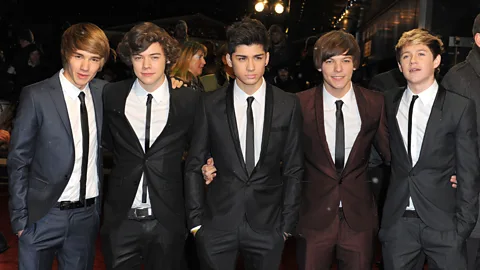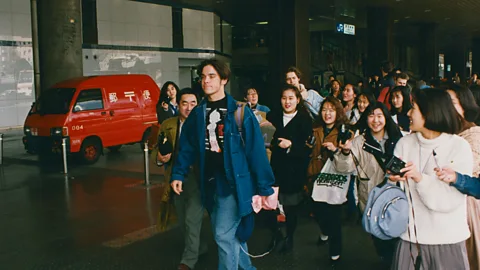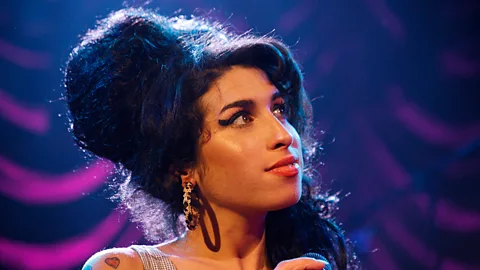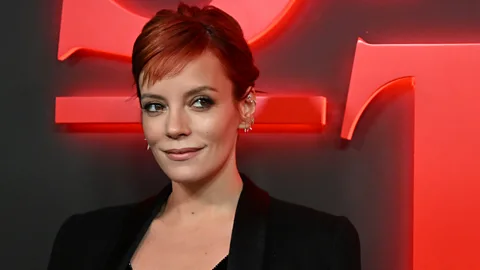Should there be a ban on teenage popstars?
 Alamy
AlamyAfter the death of Liam Payne at 31, music industry figures are debating the duty of care for artists who find fame at a young age - some have suggested an all-out ban might be the solution.
As tributes poured in following the death of the death of One Directon singer Liam Payne on 16 October, the machinations of the music industry stopped for a beat. Here was yet another musician who had experienced stratospheric levels of fame from a young age – Payne was 16 when his boyband was formed on the UK reality TV competition The X Factor in 2010 – which had a devastating impact on his mental health, and who used drink and drugs in a bid to self-medicate.
In a 2019 interview with Esquire Middle East, Payne explained the pressures of being constantly subjected to global public scrutiny: "It's mainly mentally where you struggle with it. It's the getting ready and always knowing that you might be photographed. I'll get days where I just don't want to leave my house. Even if it's just going to the shop… I would sweat because I wouldn't know whether I was doing the right thing or not." He added: "Unfortunately, it does happen to everybody in this industry."
The British songwriter Guy Chambers saw disturbing parallels between Payne's story and that of his former long-term musical partner, Robbie Williams – who joined the boyband Take That aged 16 in 1990. Williams suffered debilitating panic attacks from early on in his career, also leading to his own well-documented issues with addiction. In an interview with DJ Scott Mills in 2022 Williams said of that time: "[I was] doing my GCSEs, which I failed at, to then all of a sudden being in Japan and having 3,000 fans outside and then that being the case everywhere that we go. It was unsafe and it was surreal and that, mixed with what I was ingesting to cope with my life and the way that my body and mind reacts to it, didn't mix well."
Days after Payne's death, in an interview with The Observer, Chambers suggested that under-18s should be banned from becoming popstars. He said: "I do think putting a 16-year-old in an adult world like that is potentially really damaging… I know in Robbie's case, with Take That, there wasn't any proper protection set up to look after what were teenage boys. That was a long time ago, but I don't see much sign of change. There is not much more real care taken, that I have observed, from people involved in the big television talent shows. I would suggest that people should not be in a boyband until they are 18, and the industry should stick to that, too."
 Getty Images
Getty ImagesIt's certainly an interesting proposal. With each shock death of another troubled artist who rose to fame at a young age, there are murmurs that "something needs to change" in the music industry, but then it's back to business as usual. Amy Winehouse – who studied at the Brit school aged 15 and was first signed to a record label aged 19 – achieved incredible success in her music career, but was subjected to traumatic treatment by the press as a young, female celebrity, and was troubled by addiction issues. She died from alcohol poisoning, aged 27, in 2011.
The Swedish DJ Avicii – real name Tim Bergling – had been releasing dance tunes from age 17, and documented his own experiences of anxiety along with a crippling touring schedule in his 2017 documentary, Avicii: True Stories. He struggled with opioid and alcohol addictions and killed himself, aged 28, in 2018. Aaron Carter, who released his first album aged nine, had a harrowing time for what was left of his childhood, had substance abuse issues, was diagnosed with schizophrenia and bipolar disorder in 2019, and died of an accidental drugs overdose aged 34, in 2022. Now in 2024, has anything improved when it comes to safeguarding or a duty of care towards young music stars?
'A damaging cycle'
The impact of fame at a young age is something that psychologist Dr Adi Jaffe has encountered over the years in his treatment of musicians, actors and DJs in the US. What's particularly troubling, he says, is that these young people are placed in an adult world that they're not equipped to deal with, mentally or physically.
"We leave these young, creative, often times shy and introverted artistic minds," he tells the BBC, "and we run them through a heavily incentivised capitalistic system and there's a lot of money to be made for a lot of people. And at first, it's charming, and the parties are great, the celebrities that come to meet you are wonderful too; you get to live this fantasy life, but as we've seen, there are many, many artists we know, and whose music we know, who struggle and who are caught in that same machine."
 Getty Images
Getty Images"I have worked with artists who have a schedule of about 150 to 200 performance dates a year," he says. "That means being on shuttles, buses and airplanes essentially every day of the year. They have no stable home environment, they're in constantly changing and completely different time zones, and they have to perform, but then need to sleep on a plane to rest for the next performance. These teens start relying on sleeping pills and stimulants to keep them up for the shows and it becomes an incredibly damaging cycle of inappropriate but necessary habits."
Human brains are continually developing throughout childhood and adolescence – meaning they are more vulnerable to the extreme pressures and punishing workload of the popstar life. Jaffe says: "Children aren't formed enough in their resilience to be able to do this [punishing work schedule] day in and day out. When you perform at the frequency these kids are asked to do, you have to be willing to turn on the energy for the performance, regardless of your own level of mental health functioning. There's the emotional labour; the fatigue."
Additionally, he says that they miss out on other important developmental steps: "There is the importance of social connection in those younger age groups and the reality is that when you get pushed into the limelight in that way, you become incredibly isolated and your social life is almost taken away from you." Payne had previously spoken of the loneliness of life on the road leading to a dependency on alcohol, telling The Diary of a CEO podcast: "It feels like when we were in the band, the best way to secure us, because of how big it got, was just to lock us in our rooms and of course, what's in the room? Minibar. So, at a certain point, I thought 'Well I'm going to have a party for one' and that just seemed to carry on through many years of my life."
He added: "I spoke to somebody about this and in child development, as a teen, the one thing you need is freedom to make choices and freedom to do stuff… although we could do anything we wanted it seemed from the outside, that we were always locked in a room at night and then it would be car, hotel room, stage, sing, locked."
A call for change
The mental toll of working within the music world is a widespread problem for young artists, exemplified in a 2019 study that found that 80% of 18 to 25-year-old musicians questioned said they had negative mental health issues, with anxiety and depression being the most common. And further complications can arise for commercially successful stars, some of whom can experience a public crisis, due to their reliance on unhealthy coping mechanisms like alcohol and drugs becoming the stuff of headlines and social media discourse. Jaffe adds: "Young people need to be able to have the chance to stumble and fall and learn, without it being on a public stage."
Stopping under-18s from entering the music industry is certainly one preventative measure, but could Chambers' idea for keeping teens out of the pop world really work in practise? Chris Herbert, a former pop music manager and creator of the Spice Girls, is dubious. "I honestly cannot see how you would implement a minimum age threshold to work in the entertainment industry," he tells the BBC. "It has a very long history of delivering successful stars of all ages, and there will always be a young market who want artists who are relatable."
However, Herbert, who is on the board at Audoo, a music company that ensures creatives are paid fairly for public performances of their music, has called for a change in the way the industry operates. "Rather than putting our efforts into stopping it," he says, "the answer should lie in creating the right education and support for young artists and making the industry a more transparent place. Young artists and their guardians need to be fully informed and aware of the risks, as well as the rewards, that come alongside fame and the industry needs to put some proper structural support around the artists, including trained chaperones, counsellors, sociable working hours, meal breaks and regular down time."
In the UK, schoolchildren up to the age of 16 are protected by the Child Performance Licensing laws, which legislates that children performing in public or on TV must apply for a licence to perform from their local authority to ensure their "health, welfare and kind treatment" within the entertainment industry. However, this stops once the 16-year-olds are of a school-leaving age, meaning that 16 and 17-year-olds aren't covered by these welfare rules and could easily fall through the cracks, especially if their surrounding team are working to a different agenda – where profit takes priority over the artist's wellbeing. As Ed Magee, chair of the National Network for Children in Employment and Entertainment tells the BBC: "These 16-year-olds who have finished compulsory school and 17-year-olds would not covered by legislation, and so instead the responsibility to look after them would fall on to the production company, their agent and their parents, as they are still a child after all, and they would need their parents' consent.
"We're currently looking at creating a guide for parents about some of the things they need to think about when their child is going into the entertainment industry, [including] the safeguarding, travel abroad, and who is looking after the welfare of their children."
More like this:
• The fiery band that soundtracked US counterculture
In the US, while there are different laws for child actors across each state, in California, these are quite extensive – for example, a 16-year-old can only work a maximum of six hours on a school day, with at least one hour of "rest and recreation" a day. But as Jaffe points out, there is no equivalent legislation for teens in the music industry. "We should be looking to create an environment that's more responsible for minors who are unable to make the best choices for themselves," he says. "But I also think we need to work with these young people and allow them to put up their own boundaries. If they have started their career from a young age, they may not feel like they're not in control, but we could help them take control and care for their own wellbeing more fully." This should also stretch to aftercare, he suggests, and helping with the transition back to "real life" following their immediate burst of fame.
The singer-turned-actor Lily Allen was first signed to a record label in the UK aged 17, and she has since documented the traumas that arose for her for being a young, female singer in the 2000s in her 2018 memoir, My Thoughts Exactly. However, on the most recent episode of her BBC Sounds podcast, Miss Me?, she discussed with her co-host, Miquita Oliver, the issue of vulnerable young people working in the music world: "It does raise questions of support for young artists. Who benefits from them? It’s about profit and profit margins and I don't think that these people necessarily care about the wellbeing of the people involved that are putting in all the work.
 Getty Images
Getty Images"From my own experience," she added, "the people who make the most money out of music are publishers and major record labels. [Then there are the] people who go out and do the labour, in terms of promoting the work, and performing the work and writing the work, and these big companies take all of the money. But they are not employers of the artists. The artists are freelancers, independent entities that are licensed by these record companies and publishers and whoever else. So they don't have a duty of care because everyone is self-employed. There's no access to HR, so if you work for a record company and somebody sexually assaults you, or somebody offers you drugs and makes you feel uncomfortable, then you are protected because you are an employee of the record company – but the artist isn't, because they are self-employed, they are licensed by the record company."
Her own suggestion for how this could be rectified, she said, was: "Maybe the solution is to completely restructure how these things work so that the artists become employees, and therefore the record companies have more of a duty of care."
Chris Herbert also believes that being honest about the workings of the industry would help push things forward: "Along with establishing these external support systems, we must also focus on educating young artists in financial management and creating more transparency around these discussions, ensuring they have the necessary tools to effectively advocate for themselves."
Jaffe would potentially support an initiative that held younger people back from being exposed to the public. However he points out the harmful nature of celebrity in 2024 and beyond is unsustainable even for those who are over 18. "Being exposed to that level of public visibility," he says, "being put in the public eye, what with social media and the 24/7 news cycle and more exposure and access than ever before, I think it's damaging, almost regardless of age."
Whether Chambers' idea is actionable in practise or not, many believe the entertainment industry could take further measures to help prevent future tragedies. "The music industry is littered with casualties," says Herbert. "We tragically lose recognised stars to these pressures of fame and fortune, and every time this happens we all take a sobering moment of thought where we recognise the need for change. However, sooner or later we seem to resort back to how it was before.
"I do think we are getting better at identifying and talking about mental health issues, and at times providing some support, but we are not going far enough."
--
If you liked this story, sign up for The Essential List newsletter – a handpicked selection of features, videos and can't-miss news, delivered to your inbox twice a week.
